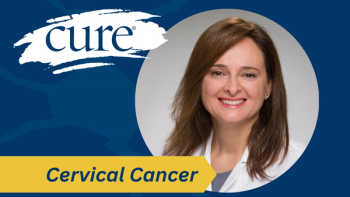
Cervical Cancer Survivor Offers Advice for During and After Treatment
For Gail Powell, helping others through her cervical cancer treatment was, in turn, one of the biggest things she did to help herself.
Gail Powell was only 31 when she was diagnosed with cervical cancer. The aftermath of her treatment — a total hysterectomy — left her unable to become pregnant and asking “Why me?” as she struggled in her recovery.
Now the mother of an adopted son she’s proud to say serves in the United States Marines Corps, Powell works for women and families as a volunteer with the National Cervical Cancer Coalition (NCCC), a program of the nonprofit American Sexual Health Association that was founded as a grassroots organization to support cervical cancer patients, survivors and caregivers. It was the perfect match for Powell.
“When I found NCCC, I needed to be a part of an effort where I could support other women,” she says. “A key part of my own healing was giving time and love to others needing the help.”
Her work runs the gamut from making presentations to groups in her community, talking with the media and lending a friendly ear and warm shoulder to women who just need to talk.
The depth of the mind and body connection is revealed in profound ways during cancer treatment.
“A woman’s reproductive health impacts her, both emotionally and physically,” Powell says. ”Knowledge really is power: When we don’t understand what’s happening with our diagnosis or therapy, the anxiety can be that much more intense.”
Not all treatment for cervical cancer impairs fertility, of course, and Powell urges patients who may want to become pregnant later to take the initiative in talking with their health care team about the potential impact of treatment on fertility.
“Ask your doctors and nurses to explain the full scope of your treatment options along with the short and long-term effects of each,” she says. “Also discuss if — given the stage of your cancer — there are any options available to preserve fertility.”
Her advice during and after treatment is not to handle everything on your own. A support system of friends, family members and co-workers can be helpful, and while undergoing radiation and chemotherapy, networking with other cancer patients can be beneficial. In addition, Powell recommends finding organizations that focus specifically on cervical and other gynecological cancers. Not only can these organizations help patients, but patients can help these organizations in return.
Above all, Powell says, don’t keep it all inside.
“You will have times when you feel all alone, and that no one wants to hear what you are going through or understand you,” she says. “Avoid the temptation to just shut down! Use your voice to become an advocate for yourself and others. ”
Simple things can help, too, and she suggests finding ways to keep occupied.
“Read a book, watch movies, have a family game night or just take walks and get fresh air and sunshine,” Powell says. “Taking a beauty or spa day once in awhile helps, too!”
For more tips and stories like Powell’s,




